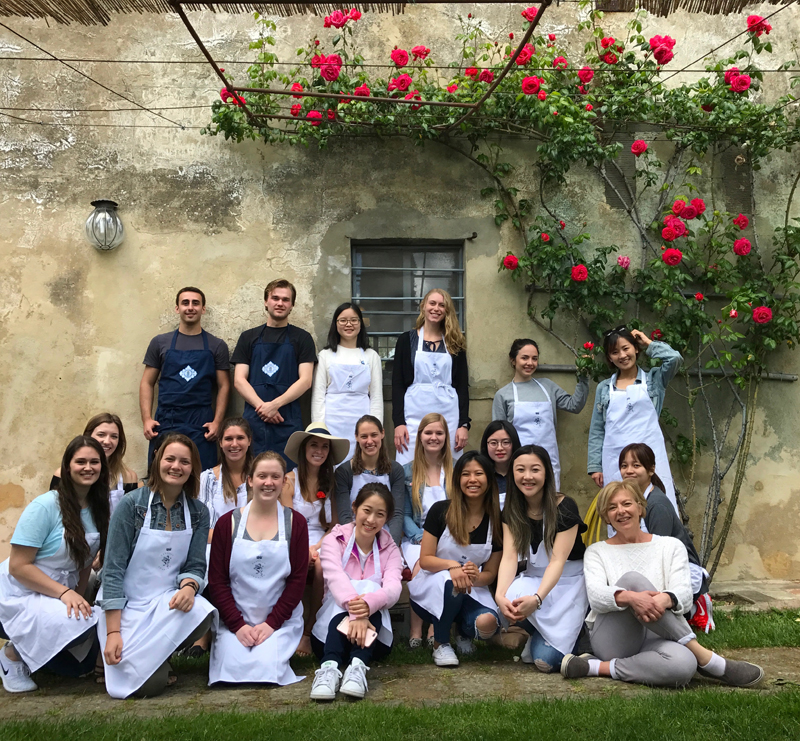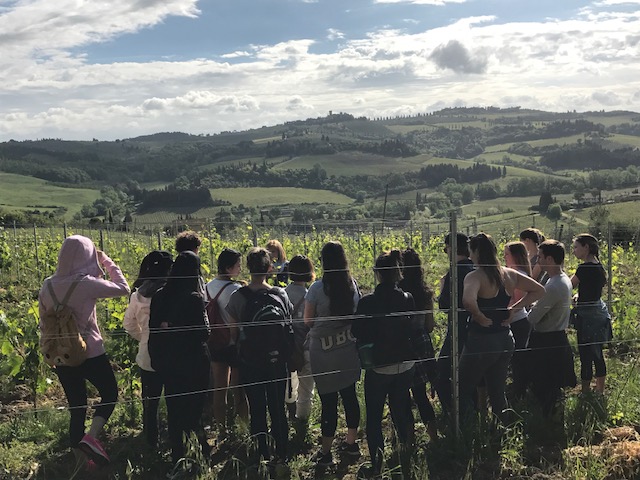20Program Overview:
This experiential seminar explores the historic and contemporary connections between local food and wine and the tourism industry in the rural countryside of Tuscany. Within a framework of sustainability students participate in local food and wine production and agritourism consumption. This program fits with UBC’s growing focus on sustainability and the international transferability of those concepts. Lessons from Tuscany, where traditional and typical food and wine systems have combined with tourism to sustain the rural countryside can inform local sustainability efforts in British Columbia.
Students are housed at historic Castello Sonnino, a 13th century estate of 150 hectares including olive orchards, market garden, vineyard and winery just outside of Firenze, near the village of Montespertoli. Our hosts, the de Renzis Sonnino family are dedicated to preservation of cultural and environmental heritage and their estate is the only operating farm, winery and historic site in Tuscany to offer university students on site experiential learning opportunities. Students will live and work within the castle at the winery, orchards, gardens and vineyards experiencing first hand the tenants of the slow food and sustainable practices of vineyard management, food production, olive oil and winemaking. Students will have their own traditional Tuscan kitchens and are offered cooking classes and workshops on traditional markets and food and wine culture and consumption. Field excursions, tours and tastings at wineries, vineyards and farms that practice sustainable methods of production and encourage sustainable consumption through out Tuscany are also included. Guest lectures in sustainable practices of tourism, wine and food production from the Universities of Firenze, Siena, Torino and Pollenzo (Gastronomic Sciences, home of the Slow Food Movement) are also provided.
General timeline
Week 1: Introduction to Castello Sonnino and Montespertoli. Introductory workshops on Italian language, wine and food culture, wine appreciation and production in Central Italy and introductory cooking class. Vineyard and orchard management and organic agricultural workshops in Montepulciano, other field excursions to market life in Montespertoli, Siena and Firenze and the wine and food trails of Chianti including, San Gimignano and Greve in Chianti.
Week 2: Workshops on winery management, production and marketing. Guest lectures on sustaining wine and food culture, and the Slow Food movement. Field excursions continue on the Chianti trail in Radda in Chianti and Montalcino and Pienza and expand into Bolgheri.
Week 3: Final lectures on sustaining rural places through tourism, wine and food. Workshops on soil and agricultural biodiversity, organic production and ancient grain and seed preservation. Field excursions continue on the food and wine trails to Cortona, Volterra and Arezzo.
Dates:
April 29 – May 20, 2018
Academics:
GEOG 491: Selected Topics in Sustainability: Rural Sustainability in Central Italy
Eligibility Requirements:
An interest in Sustainability is important but previous study isn’t required.
Program Fee:
$3,500-$3,700 CAD
NOTE: The program fee will be offset by $1,000 for UBC students qualifying for the Go Global Award (i.e., those students with a 70% average over 24 credits during the 2016-2017 academic year).
Program Terms: 2018 29th April – 20th May
Program Type: Faculty-Led
Language of Instruction: English
Academic Field: Geography
Undergraduate/Graduate: Graduate, Undergraduate
Rural Sustainability: Tourism, Food and Wine in Central Italy




